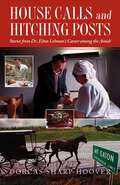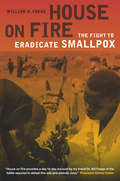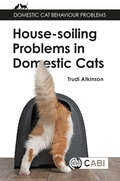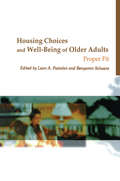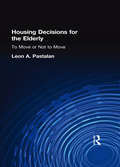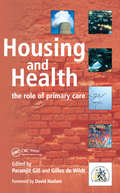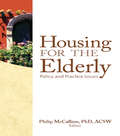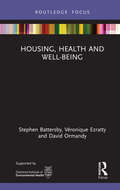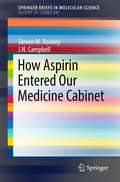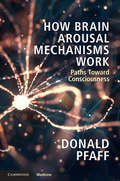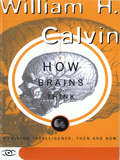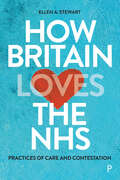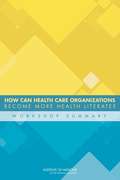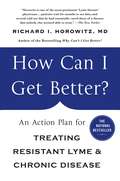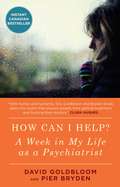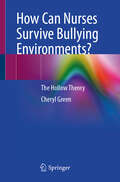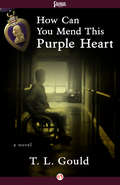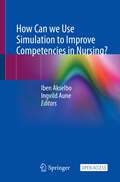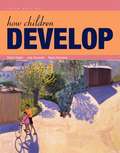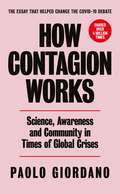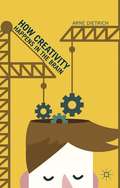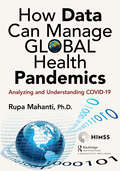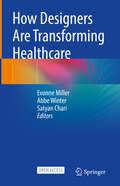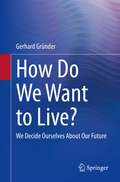- Table View
- List View
House Calls and Hitching Posts: Stories from Dr. Elton Lehman's Career Among the Amish
by Dorcas Sharp HooverStories from the life of a doctor to the Amish.
House Calls and Hitching Posts: Stories from Dr. Elton Lehman's Career among the Amish
by Dorcas Sharp HooverMedical technology meets rural, Amish values of simplicity, home health remedies, and unwavering faith in divine providence when a country-boy-turned-country doctor returns to his roots in Ohio.**This new edition is updated with a new preface and never-before-shared details about the tragedy of the Nickel Mines school shooting as well as the incredible forgiveness displayed by the Amish community.**House Calls and Hitching Posts is a sometimes humorous and often intimate account of Dr. Elton Lehman's thirty-six years practicing medicine among the Amish of Wayne, Holmes, and surrounding counties in Ohio, for which he was named Country Doctor of the Year.Now you can witness house calls and private moments between doctors and patients. Joe brings his dismembered fingers to the office in a coffee can filled with kerosene. Katie delivers a boy for the doctor's first home-birth. And Davy rallies to overcome a life-threatening illness at birth only to be crushed under a tractor wheel at three years old. Hoover captures in sometimes local vernacular the joys and dilemmas of a family practitioner among a rural and predominantly-Amish community. Includes a gallery of photographs from Dr. Lehman's distinguished career.
House on Fire: The Fight to Eradicate Smallpox
by William H. FoegeA story of courage and risk-taking, House on Fire tells how smallpox, a disease that killed, blinded, and scarred millions over centuries of human history, was completely eradicated in a spectacular triumph of medicine and public health. Part autobiography, part mystery, the story is told by a man who was one of the architects of a radical vaccination scheme that became a key strategy in ending the horrible disease when it was finally contained in India. In House on Fire, William H. Foege describes his own experiences in public health and details the remarkable program that involved people from countries around the world in pursuit of a single objective--eliminating smallpox forever. Rich with the details of everyday life, as well as a few adventures, House on Fire gives an intimate sense of what it is like to work on the ground in some of the world's most impoverished countries--and tells what it is like to contribute to programs that really do change the world.
House-soiling Problems in Domestic Cats (Domestic Cat Behaviour Problems)
by Trudi AtkinsonHighly practical, this book is the first in a series entitled Domestic Cat Behaviour Problems designed to help veterinary professionals and behaviourists understand the background behind common domestic cat behaviour problems and provide various treatment strategies. The text in this volume covers feline problem elimination and marking behaviour inside the home, outlining: *Normal behaviour. *The various underlying causes of feline house-soiling. *Prevention of unwanted behaviour. *Recognition of potential trigger factors and warning signs. *How to identify contributory factors. *Practical treatment strategies. Brimming with sound practical advice, this book will be invaluable to veterinarians, veterinary nurses/technicians, clinical animal behaviourists, and those studying domestic cat behaviour.
Housing Choices and Well-Being of Older Adults: Proper Fit
by Benyamin Schwarz Leon A PastalanMake housing for the elderly comfortable, efficient, and appropriate to their special needs!Today people are living longer lives than ever before, and elderly people need to live in settings that reflect their individual capabilities. They need safe and appropriate homes, appliances, and furnishings that they will not lose the ability to use and enjoy in the years of decline. Housing Choices and Well-Being of Older Adults: Proper Fit addresses the challenge of matching the attributes of residential settings for older adults with the competence of the people who live in them. This book views housing for the elderly as a special case in terms of the person-environment paradigm. It highlights the recurring themes that give housing for the elderly a measure of order and predictability.Care providers, consultants for retirement communities, researchers in the fields of aging and environment or gerontology, university libraries, and members of housing associations for the elderly will benefit from the timely and vital information in this book. Easy-to-understand charts and tables make the information even more accessible.Housing Choices and Well-Being of Older Adults discusses: the state of theory development in environmental gerontology housing needs of the elderly quality issues in this type of setting design and development issues kitchen, bathroom, and bedroom applications for elderly people in various states of health home safety issues and much more!and the issues surrounding continued aging and its implications for: supportive environmental, health, and psychosocial services the economic and financial concerns of aging adults housing management and community issuesUse what you'll find in Housing Choices and Well-being of Older Adults to ensure that the elderly people in your life are comfortable in an environment that is safe and appropriate.
Housing Decisions for the Elderly: To Move or Not to Move
by Leon A PastalanBecause many elderly wish to age in place, they typically give little thought to the future of their housing options. Housing Decisions for the Elderly articulates the relevant issues regarding the diversity and complexity of housing decisions in terms of moving or not moving.To move or not to move is really part of the aging-in-place debate. In this guidebook, the authors deal with such issues as changes in economic income and stances; changes in household composition and health; and the psychosocial and metaphysical significance of “house.”This treatment of housing decisions regarding aging in place serves to assist professionals and laypersons to help the elderly make more informed choices and to plan better for the future. Housing Decisions for the Elderly reminds those who work with elderly persons--community organization workers; housing counselors and specialists; home health care agencies; and gerontologists--that the proportion of persons living in family settings decreases with age, so that the older the person, the more likely he or she will be living above or with nonrelatives in institutional or quasi-institutional settings.While changes in household composition typically occur at one or more points in the aging process such as death of spouse, incapacitating illness or loss of income, other housing issues to consider are addressed:why socioeconomic determinants of housing decisions of elderly homeowners focuses primarily on housing characteristics (owning vs. renting), length of housing tenure, age, and support from relatives how elderly housing assistance programs affect housing tenure deals with age as the single most important factor factors that influence pre-retiree’s propensity to move at retirement access to health care, freedom from house maintenance, and supportive services as the main determinants of moving to a continuing care retirement community
Housing and Health: The Role of Primary Care (House Of Commons Papers #2016-17 403)
by Gill Paramjit Gilles De WildtHousing is an important determinant of health. This book provides a concise overview of the impact of housing policy and the effect of housing on health. It covers the issues of homelessness and health, collaboration between organisations in delivering housing needs, and focusses on the role of primary care teams as part of the Primary Care Trusts. It will be of interest to all members of primary care organisations, especially those concerned with health and social policy, including clinicians, nurses, psychologists, managers, statutory and voluntary housing organisations, policy makers, shapers and influencers.
Housing for the Elderly: Policy and Practice Issues
by Philip McCallionFind out how housing options for the elderly are changing—and not always for the betterTo maintain or improve their quality of life, many seniors in the United States will move to new locations and into new types of housing. Housing for the Elderly addresses the key aspects of the transitions they’ll face, examines how housing programs can help, and looks at the role social workers can play to ensure they remain healthy, happy, and productive as they age. Housing for the Elderly provides the tools to build a comprehensive understanding of how housing is changing to support the growing number of elderly persons in the United States. This unique resource examines a full range of housing options, including assisted-living communities, elder friendly communities, and homelessness; looks at the effects of the Olmstead Decision of 1999, which requires states to place persons with disabilities in community settings rather than in institutions; and summarizes current research on Naturally Occurring Retirement Communities (NORCs). The book also presents a historical perspective of housing issues for the elderly, with a special focus on the discrimination of African-Americans. Topics in Housing for the Elderly include: creating elder friendly communities homelessness among the elderly in Toronto housing disparities for older Puerto Ricans in the United States grandparent caregiver housing programs how the Olmstead Decision affects the elderly, social workers, and health care providers New York State’s experience with NORCs relocation concerns of people living in NORCs the integration of services for the elderly into housing settings-particularly low-income housing moving from a nursing home to an assisted-living facility assisted-living and Medicaid and much more!Housing for the Elderly is an essential resource for social work practitioners, administrators, researchers, and academics who deal with the elderly.
Housing, Health and Well-Being (Routledge Focus on Environmental Health)
by Stephen Battersby Véronique Ezratty David OrmandyHousing is a social determinant of health and this book aims to provide a concise source of the theory and evidence on safe and healthy housing to inform students, academics, public and environmental health practitioners, and policy-makers, nationally and internationally. The book reviews the functions of housing and its relationship with the health and well-being of residents. It examines the implications of failures to satisfy those functions, including the potential impact on individuals, households, and society. It assesses options directed at avoiding, removing, or reducing threats and at promoting healthy indoor environments, particularly for the most susceptible and vulnerable members of society. It is essential reading for students, academics, and professionals within the areas of environmental health, public health, housing, built environment, social policy, housing policy, health policy, and law.
How Aspirin Entered Our Medicine Cabinet
by Steven M. Rooney J. N. CampbellThis brief traces the story of one of our most common medicines - aspirin. On a journey involving science, diverse characters, shady business deals, innovative advertising and good old-fashioned luck, Rooney and Campbell describe how aspirin was developed and marketed on a global scale. Starting at the beginning of the twentieth century, the authors explain the use of aspirin during the First World War, the development of competition drugs such as ibuprofen during the interwar years, and the application of aspirin to heart disease in the 1950s and 1960s. On a broader level, Rooney and Campbell show that the development of America's modern pharmaceuticals was a complex weaving of chemistry and mass culture. They argue that aspirin's story provides a way to understand the application of complex chemical formulas in medical results. This brief is of interest to historians of chemistry and medicine as well as the general educated reader.
How Brain Arousal Mechanisms Work: Paths Toward Consciousness
by Donald PfaffWhat are the physical paths towards consciousness? How do humans transition out of deep anesthesia, deep sleep, or traumatic brain injury? This book presents a new argument that expands past theories centered on the cerebral cortex, and instead emphasizes the longitudinally-integrated brainstem systems that are essential to the mechanism of consciousness. The workings of these vertical pathways that 'wake up the brain' are examined in neurobiological and molecular detail. Mirroring the evolution of this system from fish to humans, chapters in the book move from hindbrain to forebrain and from animal brain to human brain, developing the unified approach involved in the brain arousal mechanism. Considering consciousness through an array of neuronal structures, this book provides a new physical explanation of the phenomenon. Written for neurologists, neuroscientists, psychologists and psychiatrists, the book's succinct and readable tone means it is also suitable for readers interested in the workings of the brain.
How Brains Think: Evolving Intelligence, Then And Now
by William H. CalvinIf you’re good at finding the one right answer to life’s multiple-choice questions, you’re ”smart. ” But ”intelligence” is what you need when contemplating the leftovers in the refrigerator, trying to figure out what might go with them; or if you’re trying to speak a sentence that you’ve never spoken before. As Jean Piaget said, intelligence is what you use when you don’t know what to do, when all the standard answers are inadequate. This book tries to fathom how our inner life evolves from one topic to another, as we create and reject alternatives. Ever since Darwin, we’ve known that elegant things can emerge (indeed, self-organize) from ”simpler” beginnings. And, says theoretical neurophysiologist William H. Calvin, the bootstrapping of new ideas works much like the immune response or the evolution of a new animal species--except that the brain can turn the Darwinian crank a lot faster, on the time scale of thought and action. Drawing on anthropology, evolutionary biology, linguistics, and the neurosciences, Calvin also considers how a more intelligent brain developed using slow biological improvements over the last few million years. Long ago, evolving jack-of-all trades versatility was encouraged by abrupt climate changes. Now, evolving intelligence uses a nonbiological track: augmenting human intelligence and building intelligent machines.
How Britain Loves the NHS: Practices of Care and Contestation
by Ellen A. StewartEPDF and EPUB available Open Access under CC-BY-NC-ND licence. What does it mean to love a healthcare system? It is often claimed that the UK population is unusually attached to its National Health Service, and the last decade has seen increasingly visible displays of gratitude and love. While social surveys of public attitudes measure how much Britain loves the NHS, this book mobilises new empirical research to ask how Britain loves its NHS. The answer delves into a series of public practices – such as campaigning, donating and volunteering within NHS organisations – and investigates how attitudes to the NHS shape patient experience of healthcare. Stewart argues that these should be understood as practices of care for, and contestation about the future of, the healthcare system. This book offers a timely critique of both the potential, and the dysfunctions, of Britain’s complex love affair with the NHS.
How Can Health Care Organizations Become More Health Literate?: Workshop Summary
by Roundtable on Health LiteracyApproximately 80 million adults in the United States have low health literacy - an individual's ability to obtain, process, and understand basic health information. Low health literacy creates difficulties in communicating with clinicians, poses barriers in managing chronic illness, lessens the likelihood of receiving preventive care, heightens the possibility of experiencing serious medication errors, increased risk of hospitalization, and results in poorer quality of life. It is important for health care organizations to develop strategies that can improve their health literacy, yet organizations often find it difficult to determine exactly what it means to be health literate. How Can Health Care Organizations Become More Health Literate?: Workshop defines a health literate health care organization as "an organization that makes it easier for people to navigate, understand, and use information and services to take care of their health. " In November 2011, the IOM Roundtable on Health Literacy held a workshop to discuss the growing recognition that health literacy depends not only on individual skills and abilities but also on the demands and complexities of the health care system. How Can Health Care Organizations Become More Health Literate?: Workshop summarizes the workshop.
How Can I Get Better?: An Action Plan for Treating Resistant Lyme & Chronic Disease
by Richard HorowitzAN INSTANT NATIONAL BESTSELLER!“Horowitz is one of the most prominent ‘Lyme literate’ physicians…patients wait for months to see him, and several told me that he had essentially cured them of a disease that nobody else seemed able to treat.” —The New Yorker“If you have suffered from unexplained, chronic or hard-to-treat illness, this book is your pathway to health.” —Mark Hyman, #1 New York Times bestselling author of The Blood Sugar Solution on Why Can’t I Get Better?From Dr. Richard I. Horowitz, one of the country's foremost doctors, comes a ground-breaking book about diagnosing, treating and healing Lyme, and peeling away the layers that lead to chronic disease.Are you sick, but can’t find any answers why? Do you have a seemingly unconnected collection of symptoms that leave doctors guessing? Or have you been diagnosed, but found that none of the treatments seems to make a difference? You may have Lyme disease and not even know it. Known as “the great imitator,” Lyme disease and its associated co-infections can mimic the symptoms of and often be misdiagnosed as Chronic Fatigue Syndrome, fibromyalgia, rheumatoid arthritis, lupus, multiple sclerosis, and even depression, anxiety, obsessive-compulsive disorder, and psychosis. In his landmark book, Why Can’t I Get Better?: Solving the Mystery of Lyme & Chronic Disease, renowned internist and leading world expert Dr. Horowitz introduced his revolutionary plan for treating Lyme disease, and chronic diseases in general. Now, in this new handbook How Can I Get Better?, Dr. Horowitz updates his research and offers a direct, actionable step-by-step plan for implementing his 16 MSIDS Diagnostic Map.You will find:*The latest pertinent information on the most important scientific discoveries *Emerging research on bacterial “persisters”—bacteria that can survive antibiotics—and new therapies to get rid of them*A seven-step action plan that patients and doctors can follow to ensure better health.
How Can I Help?: A Week in My Life as a Psychiatrist
by David Goldbloom Pier Bryden, M.D.A humane behind-the-scenes account of a week in the life of a psychiatrist at one of Canada’s leading mental health hospitals. How Can I Help? takes us to the frontlines of modern psychiatric care.How Can I Help? portrays a week in the life of Dr. David Goldbloom as he treats patients, communicates with families, and trains staff at CAMH, the largest psychiatric facility in Canada. This highly readable and touching behind-the-scenes account of his daily encounters with a wide range of psychiatric concerns—from his own patients and their families to Emergency Department arrivals—puts a human face on an often misunderstood area of medical expertise. From schizophrenia and borderline personality disorder to post-traumatic stress syndrome and autism, How Can I Help? investigates a range of mental issues. What is it like to work as a psychiatrist now? What are the rewards and challenges? What is the impact of the suffering—and the recovery—of people with mental illness on families and the clinicians who treat them? What does the future hold for psychiatric care? How Can I Help? demystifies a profession that has undergone profound change over the past twenty-five years, a profession that is often misunderstood by the public and the media, and even by doctors themselves. It offers a compassionate, realistic picture of a branch of medicine that is entering a new phase, as increasingly we are able to decode the mysteries of the brain and offer new hope for sufferers of mental illness.
How Can Nurses Survive Bullying Environments?: The Hollow Theory
by Cheryl GreenThe Hollow Theory examines the emergence of toxicity in the workplaces of nurses. This book explores the origins of bullying and incivility as the profession of nursing emerges as a vulnerable one for insecure bullies to prey upon the focused and productive employee in order to elevate their own self-perceived personal and professional deficits. Toxic workplaces are maintained to control others and negatively impact affected persons who do not adapt to the dysfunction and choose to be true to themselves both personally and professionally. Healthy workplaces exist when healthy people take back control of the workplace by alleviating toxic norms (e.g., bullying, rudeness, lying, etc.). This book will help nurse leaders to support impacted nurses.
How Can You Mend This Purple Heart
by T. L. GouldWinner of the Marine Corps Heritage Foundation's James Webb Award for distinguished fiction In this riveting first novel, author T. L. Gould draws on his experiences in a military hospital with severely wounded Marines recovering from the Vietnam War. He has created a plain-truth, no-holds-barred narrative, stark in its simplicity, detail, and humor. From dressing changes and morphine drips to off-site forays under a fence and into neighborhood bars and brothels, Gould chronicles the precipitous journey to recovery of the men of Ward 2B: how they learned to walk again, to love again, and to triumph over crippling injuries. How Can You Mend This Purple Heart is not a story about combat in the jungles of Vietnam. It is a story about boys who returned from combat as men--men who left the better part of their youth, a bit of their souls, and a lot of their flesh in a battlefield on the other side of the world. It's a story about their longing to recapture the spirit of boyhood and rekindle the optimism and fearlessness of youth. And it's about their struggle to be whole again--or at the very least, to feel whole. It chronicles a journey of love, redemption, sorrow, and joy; a journey of pain and anger . . . and a journey of hope. But most of all, a journey of the human spirit and its triumph over the most impossible odds. How Can You Mend This Purple Heart is a tribute to all the combat-wounded veterans of past and present conflicts. May they find the strength to continue their lives' missions and know that the entire nation is grateful for their sacrifices.
How Can we Use Simulation to Improve Competencies in Nursing?
by Iben Akselbo Ingvild AuneThis open access book offers an overview of theories related to simulation and describes different simulation areas within nursing. It illustrates how simulation may be used in different levels in professional education. The book deals with the role of the Simulation Facilitator, peer learning and the use of Virtual Reality in simulation. It provides new insights and paths to the development of the use of simulation within nursing and healthcare and contributes with new knowledge from research and experiences of implementation of different simulating scenarios within nursing and midwifery. It is intended to teachers in nursing and other healthcare professionals with an interest in the use of active learning methods.
How Children Develop
by Nancy Eisenberg Robert S. Siegler Judy S. DeLoacheWorth is proud to publish the Third Edition of How Children Develop by Robert S. Siegler, Judy S. DeLoache, and Nancy Eisenberg—the leading textbook for the topically-organized child development course. Providing a fresh perspective on the field of child development, the authors emphasize fundamental principles, enduring themes, and important recent studies to provide a unique contribution to the teaching of child development.
How Contagion Works: Science, Awareness and Community in Times of Global Crises - The short essay that helped change the Covid-19 debate
by Paolo Giordano'Lucid, calm, informed, directly helpful in trying to think about where we are now... The literature of the time after begins here' Evening Standard'Taking a breather from bewildering statistics and terrible tales of contagion to read Giordano's book was a jolt of brevity and simplicity... It takes concepts that have been dancing away in our minds, just out of reach, and lines them up neatly' The Times'Potent and original' Sunday Times'In one short hour, in the midst of this difficult moment, Giordano reinforced my sense of hope in humanity, in the one and the many' Philippe Sands, author of East West Street and The Rat LineThe Covid-19 pandemic is the most significant health emergency of our time.Writing from Italy in lockdown, physicist and novelist Paolo Giordano explains how disease spreads in our interconnected world: why it mattershow it impacts ushow we must reactExpanding his focus to include other forms of contagion - from the environmental crisis to fake news and xenophobia - Giordano shows us not just how the coronavirus crisis got so bad so quickly, but also how we can work together to create change.Paolo Giordano is a physicist and the author of four bestselling novels. His article 'The Mathematics of Contagion' - published in Italy at the beginning of the coronavirus emergency - was shared more than 4 million times and helped shift public opinion in the early stages of the epidemic.
How Creativity Happens in the Brain
by Arne DietrichHow Creativity Happens In The Brain is about the brain mechanisms of creativity, how a grapefruit-sized heap of meat crackling with electricity manages to be so outrageously creative. It has a sharp focus: to stick exclusively to sound, mechanistic explanations and convey what we can, and cannot, say about how brains give rise to creative ideas.
How Data Can Manage Global Health Pandemics: Analyzing and Understanding COVID-19 (HIMSS Book Series)
by Rupa Mahanti"This book bridges the fields of health care and data to clarify how to use data to manage pandemics. Written while COVID-19 was raging, it identifies both effective practices and misfires, and is grounded in clear, research-based explanations of pandemics and data strategy….The author has written an essential book for students and professionals in both health care and data. While serving the needs of academics and experts, the book is accessible for the general reader." – Eileen Forrester, CEO of Forrester Leadership Group, Author of CMMI for Services, Guidelines for Superior Service "…Rupa Mahanti explores the connections between data and the human response to the spread of disease in her new book,... She recognizes the value of data and the kind of insight it can bring, while at the same time recognizing that using data to solve problems requires not just technology, but also leadership and courage. This is a book for people who want to better understand the role of data and people in solving human problems." -- Laura Sebastian-Coleman, Author of Meeting the Challenges of Data Quality Management In contrast to the 1918 Spanish flu pandemic which occurred in a non-digital age, the timing of the COVID-19 pandemic intersects with the digital age, characterized by the collection of large amounts of data and sophisticated technologies. Data and technology are being used to combat this digital age pandemic in ways that were not possible in the pre-digital age. Given the adverse impacts of pandemics in general and the COVID-19 pandemic in particular, it is imperative that people understand the meaning, origin of pandemics, related terms, trajectory of a new disease, butterfly effect of contagious diseases, factors governing the pandemic potential of a disease, strategies to combat a pandemic, role of data, data sharing, data strategy, data governance, analytics, and data visualization in managing pandemics, pandemic myths, critical success factors in managing pandemics, and lessons learned. How Data Can Manage Global Health Pandemics: Analyzing and Understanding COVID-19 discusses these elements with special reference to COVID-19. Dr. Rupa Mahanti is a business and data consultant and has expertise in different data management disciplines, business process improvement, regulatory reporting, quality management, and more. She is the author of Data Quality (ASQ Quality Press) and the series Data Governance: The Way Forward (Springer).
How Designers Are Transforming Healthcare
by Evonne Miller Abbe Winter Satyan ChariThis is an open access book.How Designers are Transforming Healthcare is a bold manifesto for change, demonstrating the value of a strategic design-led approach. Drawing on a rich array of real-world projects, this book illustrates how designers, in collaboration with clinicians and consumers, are co-creating transformative change across healthcare environments, products, services, and systems.In a fascinating multi-voice conversation, this book outlines how design methods and mindsets, including co-design, prototyping, design and futures thinking, facilitates creative problem-solving. The ideas, tools, and challenges in How Designers are Transforming Healthcare make it a vital text - a doer’s guide - for designers, clinicians, academics, consumers, and policymakers seeking innovative strategies for engagement, innovation and improvement in healthcare.
How Do We Want to Live?: We Decide Ourselves About Our Future
by Gerhard GründerDo you also ask yourself how much your thinking, feeling and behavior are determined by your genes and biology? Do you doubt that interfering with our brain chemistry will make us happier and more content people? Are you skeptical that computer algorithms can capture your essence as a human being?This nonfiction book challenges the worldview of "divine man" (Harari), in which humans are determined by their biology and medicine serves to optimize them. The author shows that we are the active designers of our living conditions and thus determine our own physical and mental health.Be inspired to participate in shaping the future of a human society in which we have to decide where we live, how we live with each other, how we work, and how we educate ourselves. Target Audiences:Ideal for anyone interested in the fundamentals of brain research, psychology, and psychiatry, and who is concerned about the nature of human beings and their future.About the Author: Prof. Dr. Gerhard Gründer, psychiatrist and psychotherapist, is a professor at the University of Heidelberg. He heads the Department of Molecular Neuroimaging at the Central Institute of Mental Health in Mannheim. This book is a translation of the original German 1st edition Wie wollen wir leben? by Gerhard Gründer, published by Springer-Verlag GmbH, DE, part of Springer Nature in 2020. The translation was done with the help of artificial intelligence (machine translation by the service DeepL.com). A subsequent human revision was done primarily in terms of content, so that the book will read stylistically differently from a conventional translation. Springer Nature works continuously to further the development of tools for the production of books and on the related technologies to support the authors.

